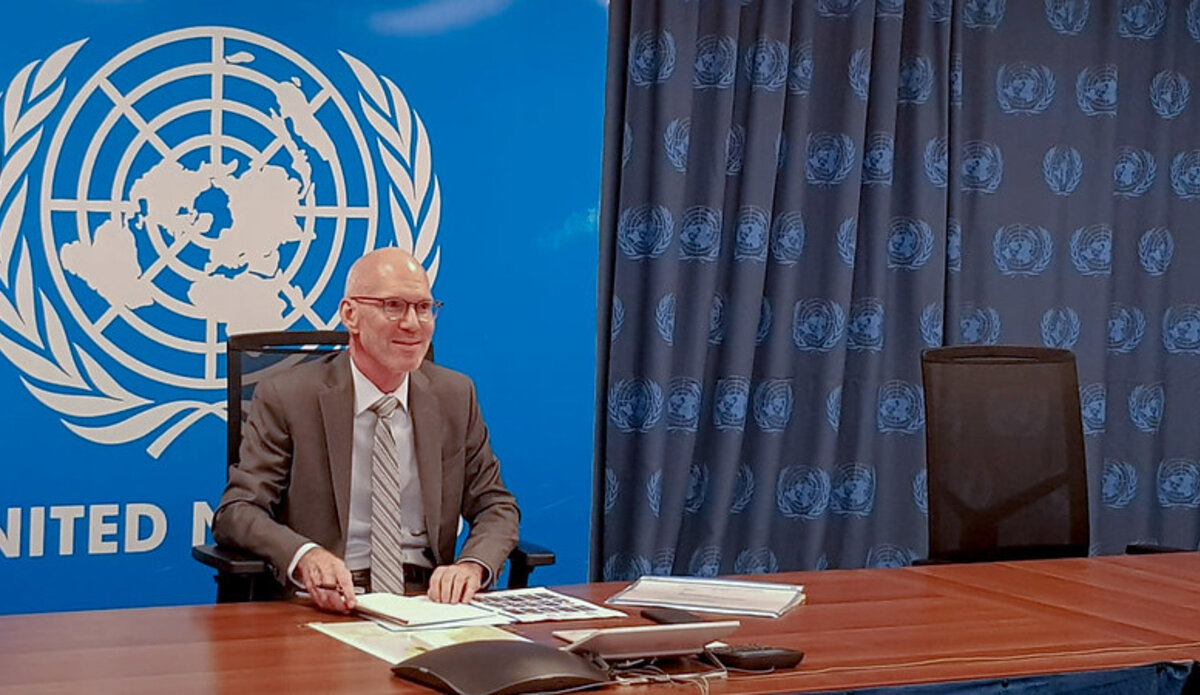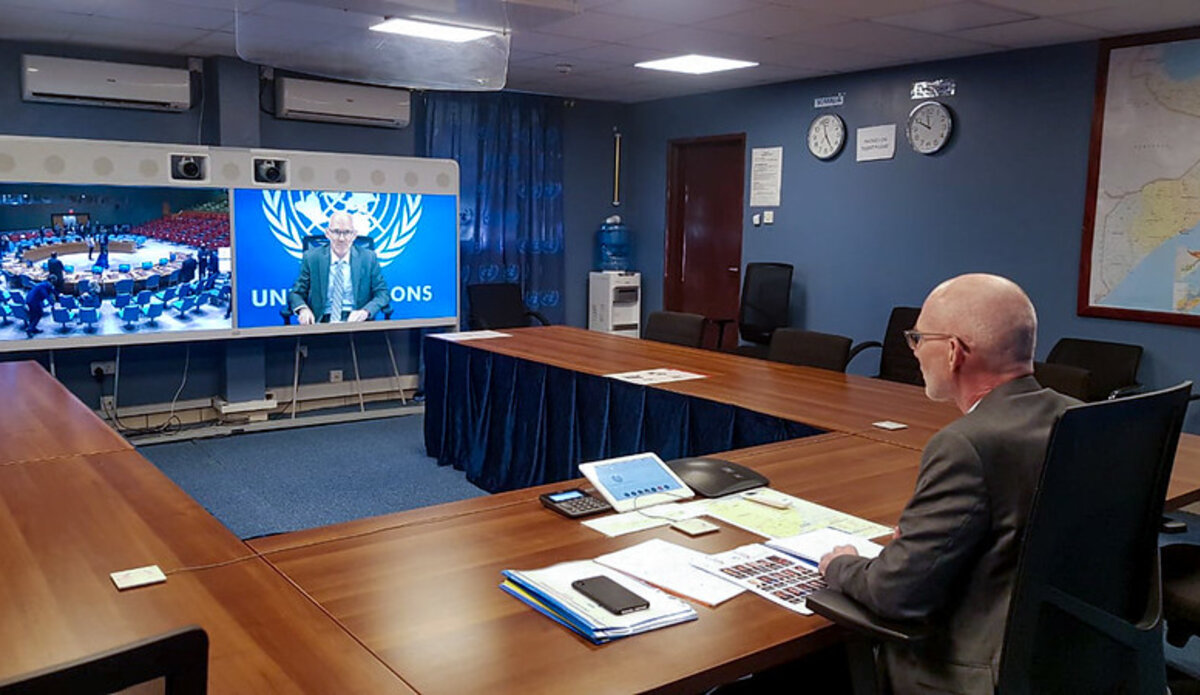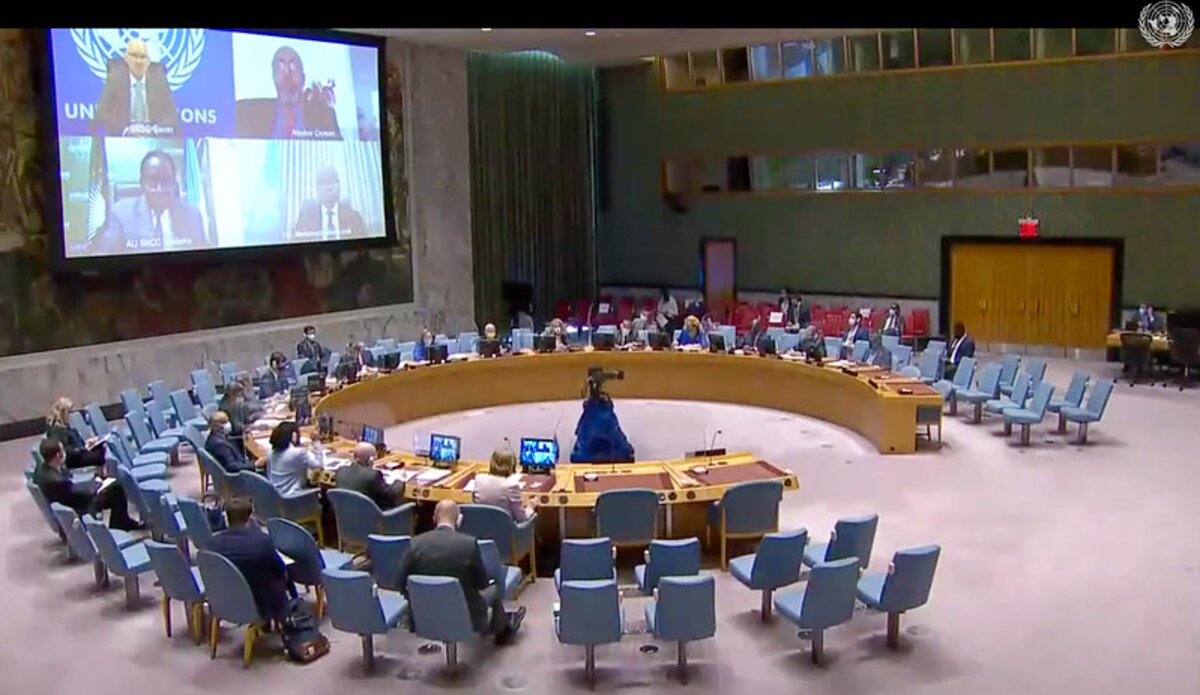Statement by Special Representative of the Secretary-General James Swan to the Security Council on the Situation in Somalia
Mr. President, Distinguished Members of the Council,
Thank you for the opportunity to brief on the situation in Somalia. I am pleased do so together again with the Special Representative of the Chairperson of the African Union Commission for Somalia, Ambassador Francisco Madeira. This underscores the importance of the relationship between our two organisations in Somalia. AMISOM continues to play a critical role in Somalia every day, and I commend the bravery and determination of Somali and AMISOM forces as they advance peace and security in the country. I also look forward to the comments of the Minister of Foreign Affairs and International Cooperation of Somalia, His Excellency Mohammed Abdirizak.
Mr. President,
The political process to implement elections in Somalia has faced many obstacles in recent months. Talks between Federal Government and Federal Member State leaders that began in March regrettably broke down in early April. The House of the People of the Somali Parliament then adopted a “Special Law” abandoning the 17 September electoral agreement, reverting to a one-person-one-vote model, and extending the mandates of current office holders for up to two more years. Opposition to these moves led to the mobilization of militias and exposed divisions within Somali security forces. Violent clashes ensued on 25 April, risking broader conflict.
Since then, Mr. President, Somalia has come back from the brink of this worst-case scenario.
Under intense pressure, the House of the People on 1 May reversed the Special Law, at the request of President Mohamed Abdullahi Mohamed “Farmajo.” The President subsequently empowered the Prime Minister to lead the FGS involvement in the electoral process, including security arrangements and negotiations with FMSes. These measures greatly eased tensions.
I commend all the Somali leaders who sought compromise and consensus during this period, and who worked to de-escalate the situation, in the interest of the nation and the Somali people. This spirit of compromise remains an urgent necessity going forward.
Prime Minister Muhammed Hussein Roble convened a new FGS-FMS summit on 22 May. This is a welcome return to dialogue after the earlier period of confrontation. Following a series of closed-door confidence-building meetings, discussions are now centred on resolving the outstanding issues related to the implementation of the 17 September Agreement and the Baidoa Technical Committee proposals. We are encouraged that, so far, a positive atmosphere prevails, and all sides report progress being made in the discussions. And if I may add, Mr. President, the news this afternoon is also highly positive, and it appears the Somali principles are very close to an agreement, but it will be for them to announce this and we hope it will be delivered in the coming hours.
The United Nations team is supporting the Office of the Prime Minister in arrangements for the summit, and greatly appreciates the contributions of key donors in this regard. We are coordinating closely with the African Union, the European Union, the Inter-Governmental Authority on Development, and other partners in our diplomatic engagements. In regard to these concerted diplomatic efforts, we deeply regret the Somali Government’s rejection of the African Union High Representative for Somalia.
I once again urge Somali leaders to find solutions in good faith, and to demonstrate the leadership the country requires of them at this historic moment. The signatories of the 17 September Agreement must now commit to a clear way forward with the holding of elections. Without this, progress on key national priorities will continue to be hampered, or worse, reversed, in critical areas, including in the security, economic and development sectors.
In proceeding to elections, it is crucial that the women’s minimum 30 per cent representation in both Houses of the Federal Parliament be implemented. The inclusion of women, but also of youth and minority groups, in political decision-making going forward is necessary to ensure the development of the country and sustainable peace in Somalia.
Mr. President,
The security situation continues to be of grave concern. Al-Shabaab remains a serious threat manifesting the ability to plan and execute complex attacks on a range of targets across Somalia. Recent incidents are outlined in greater detail in the latest report of the Secretary-General. Suffice it to say that Al-Shabaab has demonstrated both initiative and resilience in recent months. The operations of the Somali Security Forces and AMISOM therefore remain crucial in maintaining the pressure on this group.
Some progress has been made in the implementation of the revised Somalia Transition Plan. Key developments include the handover of Forward Operating Bases in Awdheegle and Barire to the Somali National Army near the end of 2020. In early April, these FOBs came under attack by Al-Shabaab, but Somali forces displayed great courage and held their ground. The pace of implementation of the Somalia Transition Plan has been impacted by the ongoing political impasse. Major commitments are behind schedule, and significant efforts will be needed to accelerate progress.
United Nations Support Office in Somalia (UNSOS) continues to provide logistical support to AMISOM and stands ready to continue to furnish non-lethal support to the Somali National Army and the Somali Police Force using voluntary contributions to the Somali Security Forces Trust Fund, as authorised by this Council. I note with great concern that the Trust Fund will be depleted by the end of June. Without urgent contributions, this vital operational and life-saving support to the Somali Security Forces will cease.
Meanwhile, the United Nations and the African Union continue to engage on the way forward in relation to the Somali security transition and the future reconfigured AU-mission. The AU and UN are in the initial stages of these discussions at Headquarters level, and further updates will be provided to the Council as preparations advance in line with the relevant resolutions of the Council.
Mr. President,
The humanitarian situation is still dire, with 5.9 million Somalis - or more than one-third of the population - in need of humanitarian assistance this year. Of these, over three million are in acute need of life-saving assistance. While 80 per cent of the country is impacted by drought conditions, heavy rains are at the same time causing seasonal flash flooding in some riverine areas. Erratic climatic shocks have led to greater displacement and increased food insecurity.
Regrettably, only 19 percent of the Humanitarian Response Plan for 2021 has so far been funded. This will not be enough to respond to the lifesaving needs of Somalis across the country. I appeal to member states to make further contributions.
On a more positive note, Somalia received the first batch of COVID-19 vaccines through the COVAX facility in March. The United Nations has worked closely with Government counterparts to ensure the effective distribution and administering of the vaccines to frontline workers. As of today, Somalia has been able to administer 42 per cent of 300,000 doses of the vaccines it had received. Going forward, it is essential that the international community continue to support Somalia’s needs for achieving optimal vaccination coverage.
Mr. President,
Let me conclude by underscoring the opportunity now before Somalia’s leaders. It is imperative that the ongoing summit in Mogadishu yield an implementable agreement to hold elections in the shortest time possible. Without such an agreement, along with the goodwill and sincerity to implement it, the gains which have been made in Somalia in recent years may be reversed, risking further instability and insecurity. I therefore greatly appreciate the close attention the Council continues to pay to the situation in Somalia.
Thank you.
Read the Report of the Secretary-General on the situation in Somalia (S/2021/485)
 UN
UN









